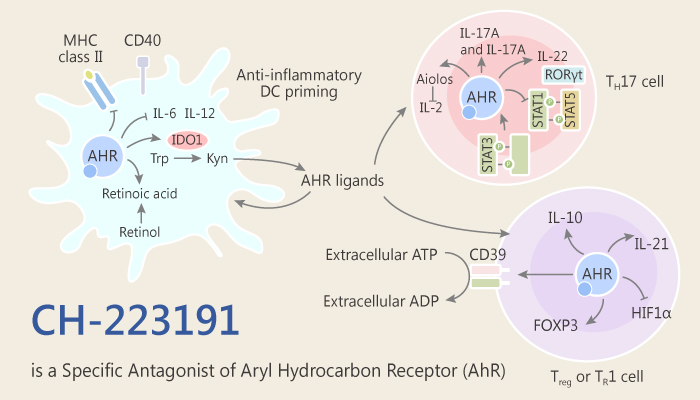CH-223191 inhibits smoking-induced aggravation of experimental arthritis via aryl hydrocarbon receptor (AHR).
Firstly, as we all know, smoking has become a major risk factor of people’s health. It involves in various kinds of diseases, such as cancer and autoimmune diseases. Epidemiologic studies show that heavy smokers develop rheumatoid arthritis more easily than non-smokers.
Th17 cells (T helper 17 cells) are pro-inflammatory T helper cells to produce interleukin 17 (IL-17). Likewise, these cells maintain mucosal barriers, responsible for pathogen clearance at mucosal surfaces. Th17 cells are related to autoimmune disorders.
Aryl Hydrocarbon Receptor (AHR) is a transcription factor, regulates gene expression. Activation of AHR plays an important role in inflammatory activity. It up-regulates interleukin 22 and down-regulates Th17 response.
In addition, Talbot J, et al has carried out a study about the smoking induced experimental arthritis. They used CH-223191 as an aryl hydrocarbon receptor antagonist in the study.

In the study, researchers established the arthritis mice model induced by cigarette smoke. As a result, CH-223191 markedly inhibits smoking-induced arthritis aggravation and the increase in Th17 frequencies. By the way, the administration route is via intraperitoneal injection with doses of 2.5 and 5 mg/kg, respectively.
Furthermore, CH-223191 abolished the increased differentiation of Th17 cells induced by CSEM (cigarette smoke-enriched medium). This also indicated AhR play a vital role in Th17 differentiation.
In summary, CH-223191 is a potent and specific AhR antagonist, reduces the aggravation of arthritis induced by smoking in mice via aryl hydrocarbon receptor.
References:
1. Talbot J, et al. Arthritis Res Ther. 2018 Jun 8;20(1):119.